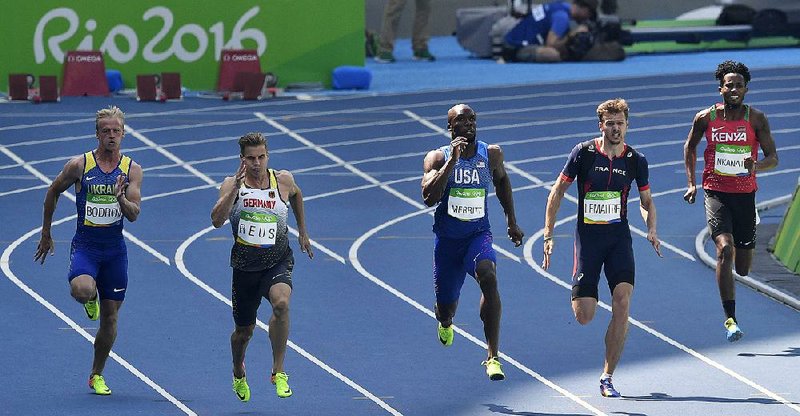Kenyan sprinter Carvin Nkanata's biggest race this week was the 12-hour dash from Florida to the Olympic Stadium in Rio de Janeiro to make the starting blocks for the 200-meter heats.
RELATED ARTICLES
http://www.arkansas…">McLeod breaks drought for ex-Hogs http://www.arkansas…">Olympic roundup http://www.arkansas…">U.S. men learning on job in Rio http://www.arkansas…">Bolt rolls in 200; Russian arrives http://www.arkansas…">Biles meets goal; future undecided http://www.arkansas…">World's fastest man also one of most riveting
2016 Summer Olympics coverage
Arkansans in the Olympics: Stories, results + more
SCHEDULE: Interactive calendar of all events
THE TORCH: Details on this year’s torch, information on torchbearers, route of the torch relay
QUIZ: Test your Summer Olympics knowledge
He did OK in that first race. In the one on the track? He finished last.
He said it was still worth it.
If you're unsure how much the Olympics means to some athletes, Nkanata's story is enlightening.
[ARKANSANS IN RIO: Full coverage of 24 in Olympics]
Initially ruled ineligible to compete for Kenya, Nkanata put in an appeal and then, without knowing the result of that appeal, took a chance.
He booked his own flights Monday afternoon, made the overnight journey from Tampa, Fla., to Miami to Rio, and arrived at the Olympic Stadium straight from the airport the next morning just in time to line up. The timeline for Tuesday morning was: Arrived in Brazil at 9:30 a.m. Got to the stadium about 11:30 a.m. Ran in the Olympics at 12:30 p.m.
That run lasted 21.43 seconds -- not a great time, but he hardly slept on the plane and didn't have time for a proper warmup at the track. Bottom line, Nkanata is down quite a few dollars and exhausted, all for less than 22 seconds of action at the Olympics.
"It's a dream. This opportunity don't come around every year. So, I just had to [do it]," Nkanata said soon after coming off the track. "I worked so hard to get here. I put in a lot of man hours, sweat, injuries to get here. So, I was like, I got to get here. I can't give up."
Nkanata has an American passport and Kenyan nationality and heritage. But Kenyan officials messed up his accreditation for the Olympics. He'd given up on getting to Rio, Nkanata said, until a lawyer in the United States heard about his story and offered to help him submit an appeal.
Nkanata said he didn't know the outcome until he landed in Brazil. The gamble paid off, and he learned he was cleared to run after he landed, he said.
Now, he's going to get his luggage out of a storage room at the stadium, check in to his room at the athletes village and enjoy the Olympics.
No soup for you
With less than a week left of the Rio Olympics, organizers are running into a new problem -- many of the Games' volunteers have, well, un-volunteered.
"Many volunteers had to quit because they had to work two weeks in a row, schedules were messed up, lots of people quit because of the food: They were told to work eight, nine hours and were only provided with a little snack," one volunteer, Luis Moreira, told Canada's CBC on Tuesday.
Moreira quit his job as a volunteer this week because of what he says is the organizing committee's lack of "consideration for people's lives and welfare."
"It was as though the organizing committee was doing us a favor," he said. "The committee uses the volunteers to make money, uses us for free labor."
Only about 35,000 of the 50,000 people who volunteered to help out at the Rio Games have continued to show up, according to the New York Daily News, but Olympic organizers say it isn't a problem.
"This number allows us to operate at a comfortable level as some volunteers not showing up was factored into our plans," organizers said (via New York Daily News).
Many of the volunteers who are disgruntled are those who work away from the action. They direct people to stadiums and arenas on the street; they shuttle officials between the venues. They're not the volunteers who, say, set the pace in the keirin track cycling races. That guy, who gets face time with his favorite athletes, seems pretty happy.
"They are not just athletes, they are Olympic athletes," 35-year-old Ivo Siebert, an avid cyclist who owns a bike shop, told the Los Angeles Times this week about his job as the pace setter for the track cycling's keirin races. "They are semi-gods."
Siebert didn't mention what his snack situation is like.
Sports on 08/17/2016
